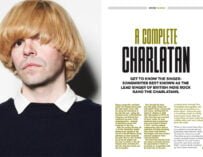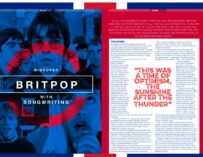With the Britpop group rising from their lengthy slumber, we managed to have a quick chat with their iconic singer/guitarist
Of all the recent band reformations and reunions, the return of Sleeper has to rank as one of the most surprising. Dormant since their third album, 1997’s Pleased To Meet You, their leader Louise Wener has forged a thriving career as a novel writer and didn’t seem in much of a hurry to return to her old band.
Thankfully things have changed and the group have recently returned with new album The Modern Age. Produced by Stephen Street, and thus rekindling the relationship which proved so successful on 1996’s Britpop classic, The It Girl, it’s a welcome return for the band behind classic 90s anthems such as Inbetweener, Sale Of The Century and Nice Guy Eddie…
Where did the idea for this album come from?
“It was one of those inspirations. It was a practical thing to do. I wanted to make sure the words will be simple and get out there right away.”
How did the reunion come about and was it always the plan to write new material?
“It was very much a spur of the moment decision. Someone very close to me became very sick in 2017. Part of my response was to do something life-affirming and completely out of my comfort zone. I just wanted to see if I could do it. Get on stage again. It was so enjoyable, we thought we’d experiment with writing again.”
What was that writing process like?
“The writing came back more easily than I thought it would. It took a while to find the groove again, and I rejected a lot of early stuff. But I think the process of writing books has made me value the editing process more. I felt very strongly that I wasn’t going to let any filler through.”
It’s been over two decades since the release of Pleased To Meet You – how do you think your songwriting has evolved in that time?
“Looking back, I think our last album suffered from not being lyrically focused. It was rushed and I’m not sure the songs were really about anything. They’re full of good images but I don’t know what they mean! On this album, every song had to have truth in it. Other than that, the process is the same. I sit with a guitar making up tunes. It a huge buzz when you find something you love.”
Have you been writing songs the whole time or were you ring-rusty coming into it?
“I hadn’t written a song for twenty years. I very purposely turned my back on it. I didn’t want anything to do with the music industry and that part of my life, so it was a huge challenge to come back to it. I listened to a lot of music. Shut myself away with it. I worked out what I liked, what gave me a rush of some kind. I had to rebuild those connections.”
Is there a typical way in which a Sleeper song tends to come to life?
“The initial process is just me with a guitar. Then I play that to Andy (Maclure) and we work on structure and arrangement. He’s my sounding board for what’s working. Then he’ll take the raw song and work on it: adding music, giving things a sound. An identity. It’s very much a two-way process between us at the start. Then we go into a rehearsal room and develop it further with the rest of the band.”
You now have former Prodigy member Kieron Pepper on bass, what does he bring to the group’s dynamic?
“There’s a great fresh perspective that a new person brings. His background is different, musically. He comes at things from a new angle.”
With regards to your lyrics, are you a notebook keeper/phone-memo maker? Where does your inspiration come from?
“I’ve always been an observer. I’m nosy! I’m interested in people. But I don’t keep notes. I just file images away somewhere in my head. This time inspiration came from so many places. Personal loss. Politics. Divorce. Growing older.”
Are there songs which existed in your heyday which you wouldn’t be able to write in 2019 and vice versa are there songs that you’ve written on the new album which couldn’t have existed back in the 90s?
“I have so much more life experience to put into the songs now. The sex, drugs, raw punk spirit isn’t as strong, but the songs are more powerful now, I think.”
Why do you think songs like Inbetweener and Sale Of The Century continue to be so popular?
“I think because they feel true. They resonate. That small-town longing and frustration in Inbetweener is something a lot of people have experienced. The joy of falling in love, the recognition that this might be the best it ever gets; I think people know that emotion from Sale Of The Century very well.”
And similarly, in a broader sense, why do you think the music from that era left such an indelible mark?
“It was the last time guitar music was dominant. The last huge wave of music in which people felt a connection, a shared camaraderie. And it was positive, uplifting music. That optimism just isn’t as strong now.”
When you have those anthems in your armoury is it possible to deconstruct them in order to try and write a similarly successful follow-up?
“I think it’s impossible to dissect in that way. I know that’s something pop writers do, but it becomes soulless. It has to come from somewhere real. If it’s a good song, it will connect. You can’t force it.”
What did Stephen Street bring to the new record and was it important to work with him again?
“He’s brilliant at taking an overview. Knowing what to add and knowing what to leave alone. Just very, very talented at what he does. It was the most nerve-wracking part of the process, sending our demos to Stephen. We thought, ‘Well, if he thinks they’re good enough to work on, we might actually have something.’ It felt important to put that team back together. It worked well originally and it was amazing to find it still does.”
Are your expectations for your songs and the LP different now?
“The pressure is much less now. This isn’t our career, it’s not everything for us this time. The challenge was to make something we’re proud of and I honestly think it might be the best record we’ve made.”
There have been huge changes in the music industry and the world in general since your last album – what impact did that have on your songwriting?
“In practical ways, the technology has made a huge difference. We were able to go a lot further with the songwriting at home. Making good quality demos, share files that other band members could listen to and add to. In terms of the wider industry, you’re very away that algorithms and playlists are king now. But again, you can’t let that stuff influence you too much. Just write a song that makes you feel something.”
Lastly, do you see this as a one-off or are Sleeper back for good?
“It’s hard to say! I’ve loved making music again, and it will be all about the joy of it and how long that lasts.”



































Related Articles